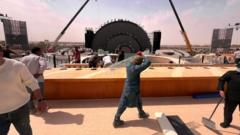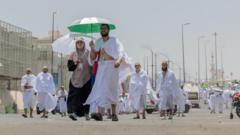Reports from Human Rights Watch and FairSquare highlight preventable workplace accidents and a lack of accountability for worker deaths, urging government action to protect this vulnerable workforce.
Surge in Deaths of Migrant Workers Raises Alarms Ahead of 2034 World Cup

Surge in Deaths of Migrant Workers Raises Alarms Ahead of 2034 World Cup
Human rights organizations express concern as fatalities among migrant construction workers in Saudi Arabia increase with the upcoming World Cup preparations.
Human rights groups are sounding alarms over an alarming rise in migrant worker deaths in Saudi Arabia as the nation gears up to host the World Cup in 2034. Recent reports from Human Rights Watch and FairSquare indicate that deaths among migrant construction laborers are linked to workplace accidents that could be avoided. They warn that these fatalities are often misclassified as natural causes, leading to inadequate compensation for the workers' families.
Minky Worden, Human Rights Watch's director of Global Initiatives, noted, "The 2034 Saudi World Cup will be the largest and most expensive ever, but it could also come at a dire cost in human lives." The massive infrastructure projects required for the event include the construction of 11 stadiums, a new rail network, and accommodation for millions, wherein the safety of millions of migrant workers hangs in the balance.
The warning coincides with a visit from FIFA President Gianni Infantino and former U.S. President Donald Trump to Saudi Arabia for an investment forum. FIFA has claimed a firm commitment to protecting human rights within its operations. However, Human Rights Watch accused it of failing to take lessons from the migrant worker fatalities experienced leading up to last year’s World Cup in Qatar.
Data on migrant deaths is scarce due to the strict limitations on human rights groups' access. However, interviews with the families of 31 migrant workers revealed harrowing accounts of deaths linked to falling from heights, heavy machinery accidents, and electrocution. The oppressive heat is also a critical concern, compounding the existing safety risks as construction speeds up in preparation for the tournament.
With recent reports revealing a trend of increased workplace fatalities, the global construction worker's union, BWI, has expressed deep concern. General Secretary Ambet Yuson attributed these calamities to systemic negligence and poor oversight. Furthermore, FairSquare noted that the lack of autopsies conducted by Saudi medical authorities hampers the determination of actual causes of deaths among migrant workers.
James Lynch, co-director of FairSquare, emphasized that many young men supporting families back home are subjected to perilous working conditions without adequate medical or political protections. FIFA, in its dialogue with Human Rights Watch, announced intentions to implement a workers' welfare system to safeguard rights during World Cup-related projects. However, concern persists regarding accountability in dealing with migrant worker fatalities.
Human Rights Watch continued to urge that all worker deaths be thoroughly investigated and that families are treated fairly and compensated appropriately. As pressure mounts on Saudi authorities and FIFA to ensure labor rights, advocates reiterate the importance of taking immediate action to prevent future tragedies. The BBC has sought comments from Saudi government officials regarding these assertions.
Minky Worden, Human Rights Watch's director of Global Initiatives, noted, "The 2034 Saudi World Cup will be the largest and most expensive ever, but it could also come at a dire cost in human lives." The massive infrastructure projects required for the event include the construction of 11 stadiums, a new rail network, and accommodation for millions, wherein the safety of millions of migrant workers hangs in the balance.
The warning coincides with a visit from FIFA President Gianni Infantino and former U.S. President Donald Trump to Saudi Arabia for an investment forum. FIFA has claimed a firm commitment to protecting human rights within its operations. However, Human Rights Watch accused it of failing to take lessons from the migrant worker fatalities experienced leading up to last year’s World Cup in Qatar.
Data on migrant deaths is scarce due to the strict limitations on human rights groups' access. However, interviews with the families of 31 migrant workers revealed harrowing accounts of deaths linked to falling from heights, heavy machinery accidents, and electrocution. The oppressive heat is also a critical concern, compounding the existing safety risks as construction speeds up in preparation for the tournament.
With recent reports revealing a trend of increased workplace fatalities, the global construction worker's union, BWI, has expressed deep concern. General Secretary Ambet Yuson attributed these calamities to systemic negligence and poor oversight. Furthermore, FairSquare noted that the lack of autopsies conducted by Saudi medical authorities hampers the determination of actual causes of deaths among migrant workers.
James Lynch, co-director of FairSquare, emphasized that many young men supporting families back home are subjected to perilous working conditions without adequate medical or political protections. FIFA, in its dialogue with Human Rights Watch, announced intentions to implement a workers' welfare system to safeguard rights during World Cup-related projects. However, concern persists regarding accountability in dealing with migrant worker fatalities.
Human Rights Watch continued to urge that all worker deaths be thoroughly investigated and that families are treated fairly and compensated appropriately. As pressure mounts on Saudi authorities and FIFA to ensure labor rights, advocates reiterate the importance of taking immediate action to prevent future tragedies. The BBC has sought comments from Saudi government officials regarding these assertions.




















